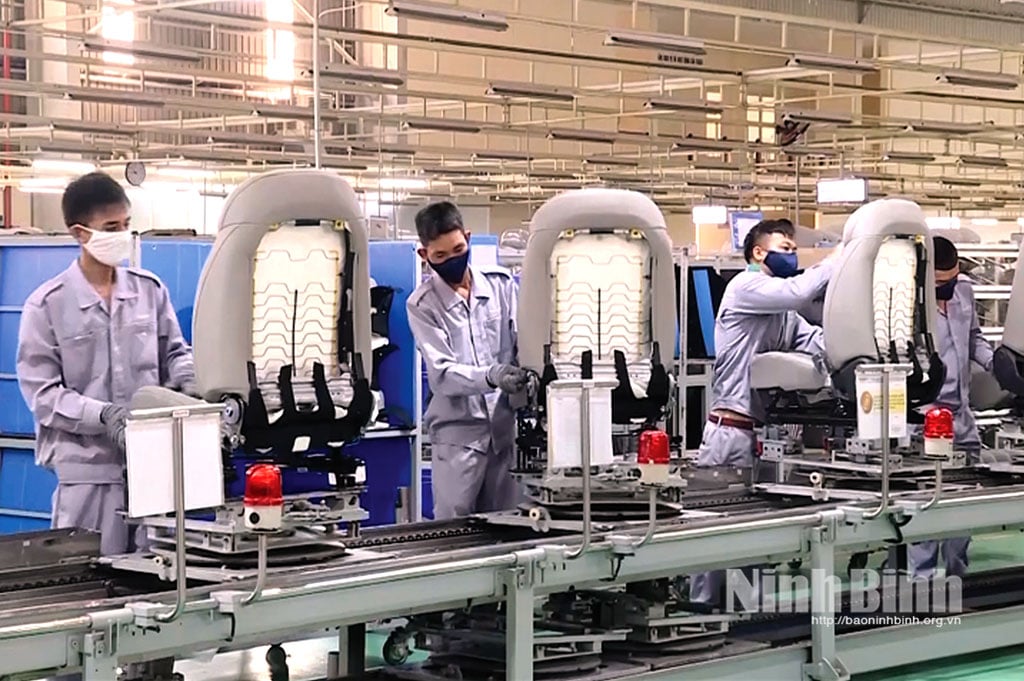
Disadvantages of the countervailing tax policy
According to the report of the Department of Industry and Trade, the province's products such as electronic components, cement-clinker, processed agricultural products, handicrafts, footwear, clothing, etc. have been exported to more than 80 countries and territories around the world, especially markets that have signed FTAs with Vietnam. In 2024, the total export turnover of the province reached 3,381.2 million USD, an increase of 5.9% compared to 2023; in the first quarter of 2025, it reached 841.7 million USD, an increase of 4.4% over the same period. Import turnover in 2024 reached 3,218.3 million USD, an increase of 14.6% compared to 2023; in the first quarter of 2025, it reached 775.9 million USD, an increase of 9.3% over the same period. Of which, Ninh Binh province's export turnover to the US market in 2024 reached 777.5 million USD, accounting for 23% of the province's total export turnover; in the first 3 months of this year, it reached 165.5 million USD, an increase of 1.16% over the same period and accounting for 19.7% of the province's total turnover.
Comrade Duong Duc Dang, Director of the Department of Industry and Trade, informed: On the morning of April 3, 2025 (Vietnam time), US President Donald Trump announced the imposition of reciprocal import tax on more than 180 trading partners, expected to be applied from April 9, imported goods from Vietnam will be subject to a tax rate of 46%, among the countries with the highest tax rate. In this situation, our Party and State have had many foreign activities with the US, as a result, the US has postponed the imposition of reciprocal tax on Vietnamese goods for 90 days to create space for negotiations and lower trade barriers (the US still imposes an additional tax of 10% during this time). However, after 90 days, if there is no suitable agreement, most of our country's export goods to the US market may be subject to a reciprocal tax of 46%.
The analysis of the Department of Industry and Trade's leaders clearly stated: In the context of many fluctuations in international trade, the US's application of high tax rates will cause great difficulties for businesses in the province when exporting goods directly to this market due to loss of market share, reduced competitiveness, and production disruption. In the immediate future, if the US applies a 46% tax rate, the export price of goods of businesses in the province to the US will increase by nearly half, causing Vietnamese goods to lose their competitive advantage in price compared to other countries that are not subject to taxes.
In the short term, businesses may be forced to sharply reduce or temporarily stop exporting to the US. If the tax rate remains unchanged, US partners may postpone or cancel orders from Ninh Binh businesses due to concerns that the tax will increase prices, resulting in the province's export turnover to the US expected to decline from the beginning of the third quarter of 2025. In the long term, direct impacts on businesses operating in labor-intensive industries such as textiles and footwear may leave socio-economic impacts when workers become unemployed, work hours are reduced, affecting the province's consumption activities.
In addition, high taxes cause businesses to suddenly shrink their profits. Many businesses may have to reduce prices and cut profits to maintain their market share. Meanwhile, others who cannot bear the costs will lose market share to competitors from countries with low taxes. Inventories increase because manufactured products may not be able to be exported to the US, causing capital congestion and weakening the cash flow of businesses. Businesses in the supply chain of raw materials for products exported to the US also face the loss of production orders, forcing them to restructure their supply chains and seek new markets, which risks reducing revenue and even forcing them to reduce production.
Not only directly affecting businesses, the 46% reciprocal tax rate makes Vietnam less attractive as a destination for export-oriented manufacturing activities, especially for products aimed at the US market. Many multinational corporations that previously shifted their production chains to Vietnam, targeting Ninh Binh to minimize the impact of US tariffs on the Chinese export market, may now have to reconsider this decision.
Proactively support businesses
Director of the Department of Industry and Trade Duong Duc Dang said that in the face of the situation that the US applies high reciprocal tax rates, which will cause great difficulties for businesses in the province when exporting goods directly to the US, the Department of Industry and Trade has sent a document to export businesses informing them that the US plans to apply reciprocal tax rates on products imported from Vietnam. At the same time, it is recommended that businesses stay calm, proactively review orders and trade contracts with US partners, and reassess production and export plans in the coming period to make appropriate adjustments. Promote quality improvement, diversify input material supply sources, meet requirements on origin of goods, and not support illegal transshipment activities in case Vietnam and the US reach a trade agreement.
Immediately after that, the Department proactively contacted the Department of Foreign Market Development, the Department of Multilateral Trade Policy, the Import-Export Department (Ministry of Industry and Trade) to update the situation of the US market, the US tariff schedules applied to each item to promptly inform export enterprises in the province to proactively plan production and export.
To avoid dependence on the traditional US market of some enterprises, the Department of Industry and Trade has promptly coordinated to implement trade promotion programs, supporting enterprises in finding new alternative markets such as Europe, Japan and ASEAN countries, the Middle East, Latin America, etc. to help enterprises find new export opportunities. At the same time, supporting enterprises in learning and researching potential export markets, promoting the provision of information on international trade policies and 17 FTAs that Vietnam participates in, helping enterprises take advantage of these opportunities to minimize the impact of increased taxes from the US; coordinating research and assessment of goods with potential risks of avoiding trade defense, strictly controlling the origin of goods exported to the US.
Along with the initiative of the Department of Industry and Trade, the Provincial People's Committee has directed relevant departments, branches, and the Provincial Business Association to quickly implement programs and projects to support businesses in enhancing and innovating technology, improving product quality to compete on value instead of relying solely on low prices. Cut unnecessary costs in production and operation to enhance price competitiveness and improve profits. Gradually shift from pure processing to manufacturing branded products that meet international standards, reduce the impact of high tax rates, and more easily penetrate other markets.
At the same time, the provincial Vietnam Fatherland Front Committee has proactively implemented solutions to support the consumption of a part of the products, especially consumer goods such as textiles, food, etc. that are in stock due to export difficulties, helping businesses to have temporary revenue while maintaining production activities and jobs for workers. Although the domestic market cannot completely replace US exports, every 1% increase in domestic market share also reduces pressure on businesses.
With a positive perspective, Director of the Department of Industry and Trade Duong Duc Dang said: "Although the US's reciprocal tax policy poses many challenges, this is also an opportunity for Vietnam in general and Ninh Binh province in particular to restructure the economy, promote the shift to a sustainable development model, reduce dependence on a few markets and improve resilience to external fluctuations."
In international trade, a “retaliatory tariff” is a tax imposed by one country on imports from another country in response to what it considers unfair trade practices, such as excessive subsidies, dumping, or the imposition of detrimental technical barriers. It is not a commonly used measure, but in certain situations it can be legally applied, provided there is sufficient evidence of injury and World Trade Organization (WTO) procedures are followed.
Source: https://baoninhbinh.org.vn/ninh-binh-chu-dong-ho-tro-doanh-nghiep-ung-pho-voi-bien-720938.htm


![[Photo] Prime Minister Pham Minh Chinh chairs the fourth meeting of the Steering Committee for Eliminating Temporary and Dilapidated Houses](https://vphoto.vietnam.vn/thumb/1200x675/vietnam/resource/IMAGE/2025/5/11/e64c18fd03984747ba213053c9bf5c5a)
![[Photo] National Assembly Chairman Tran Thanh Man attends the Party Congress of the Committee for Culture and Social Affairs](https://vphoto.vietnam.vn/thumb/1200x675/vietnam/resource/IMAGE/2025/5/11/f5ed02beb9404bca998a08b34ef255a6)
![[Photo] The moment Harry Kane lifted the Bundesliga trophy for the first time](https://vphoto.vietnam.vn/thumb/1200x675/vietnam/resource/IMAGE/2025/5/11/68e4a433c079457b9e84dd4b9fa694fe)

![[Photo] Discover the beautiful scenery of Wulingyuan in Zhangjiajie, China](https://vphoto.vietnam.vn/thumb/1200x675/vietnam/resource/IMAGE/2025/5/11/1207318fb0b0467fb0f5ea4869da5517)
![[Photo] National Assembly Chairman works with leaders of Can Tho city, Hau Giang and Soc Trang provinces](https://vphoto.vietnam.vn/thumb/1200x675/vietnam/resource/IMAGE/2025/5/11/c40b0aead4bd43c8ba1f48d2de40720e)

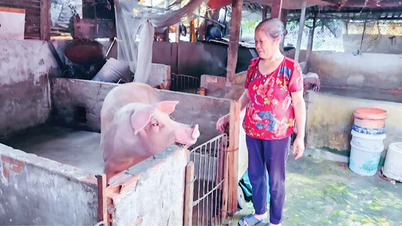

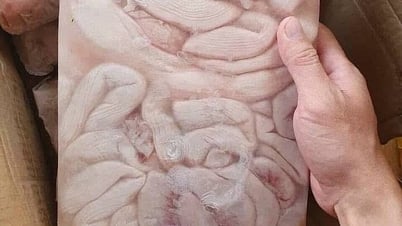









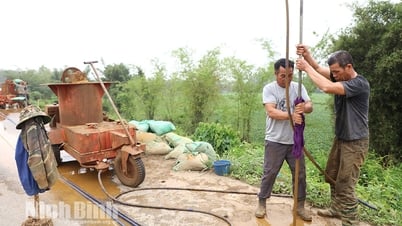
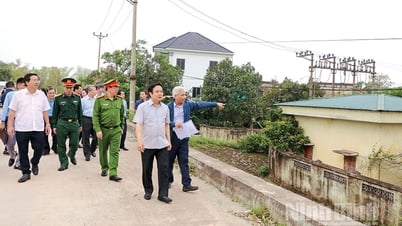




















































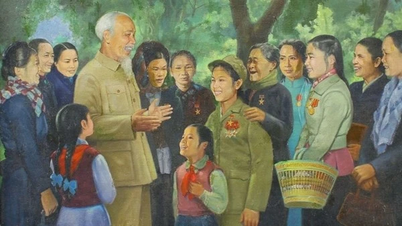











Comment (0)